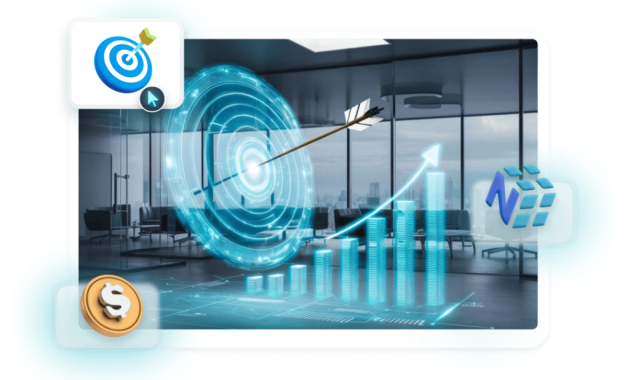
Unlock Business Intelligence Software That Solves Real Problems
In today’s data-driven world, businesses face an unprecedented deluge of information. This data, if properly harnessed, holds the key to unlocking significant competitive advantages. However, the sheer volume of data can be overwhelming. This is where business intelligence software steps in. It transforms raw data into actionable insights. This allows organizations to make informed decisions. The right business intelligence software can solve real problems. It can streamline operations, and boost profitability. This article delves into the power of business intelligence software. It explores how it addresses critical business challenges. It also provides guidance on selecting the right solution.
Understanding the Core of Business Intelligence
Business intelligence (BI) is more than just fancy dashboards. It’s a strategic approach. It combines data analysis, data visualization, and reporting. It provides executives and employees with the insights needed to improve performance. Effective BI tools collect, analyze, and present data. They do this in an easy-to-understand format. This allows users to identify trends, patterns, and anomalies. This fosters better decision-making. The goal of any business intelligence software is to empower users. It allows them to understand their business better. It also helps them to make data-driven decisions.
The core components of business intelligence include:
- Data Collection: Gathering data from various sources. This includes databases, spreadsheets, and cloud services.
- Data Warehousing: Organizing and storing data in a central repository. This allows for efficient analysis.
- Data Analysis: Applying analytical techniques. This includes statistical analysis and data mining. This helps uncover valuable insights.
- Data Visualization: Presenting data in charts, graphs, and dashboards. This makes it easier to understand.
- Reporting: Generating reports. This provides regular updates on key performance indicators (KPIs).
Real Problems Solved by Business Intelligence Software
Business intelligence software isn’t just a luxury. It’s a necessity for businesses seeking to thrive. This software addresses a range of real-world challenges. It also provides tangible benefits across various departments. The following are some of the key problems that business intelligence software helps to solve:
Inefficient Operations
Many businesses struggle with operational inefficiencies. These inefficiencies can lead to wasted resources and lower profits. Business intelligence software provides insights into operational processes. It helps identify bottlenecks and areas for improvement. For example, a manufacturing company can use BI to track production efficiency. They can also identify machines with high downtime. This information allows them to optimize their operations. This also helps reduce costs. It also helps to improve overall productivity.
Poor Decision-Making
Making decisions based on gut feelings can be risky. It can also lead to missed opportunities. Business intelligence software provides data-driven insights. It empowers decision-makers. This allows them to make informed choices. For instance, a retail company can use BI to analyze sales data. They can then identify the most popular products. This information helps them to optimize their inventory. It also helps them to make better marketing decisions. These decisions are based on real data.
Lack of Customer Understanding
Understanding customers is crucial for business success. Without a clear understanding, it’s difficult to meet customer needs. It’s also difficult to tailor products and services. Business intelligence software helps businesses gain a deeper understanding of their customers. It analyzes customer data from various sources. This includes website activity, purchase history, and social media interactions. This analysis reveals customer preferences, behaviors, and trends. This data helps businesses to personalize their marketing efforts. It also improves customer service. This creates stronger customer relationships. It also boosts customer loyalty.
Ineffective Marketing Campaigns
Marketing campaigns can be costly. Measuring their effectiveness is essential. Without effective measurement, it’s difficult to optimize marketing spend. Business intelligence software allows businesses to track the performance of their marketing campaigns. It analyzes data from various channels. This includes email, social media, and paid advertising. This analysis helps to identify which campaigns are most effective. It also reveals which ones are underperforming. This information allows businesses to optimize their marketing strategies. It also helps them to allocate their marketing budgets more effectively. This also helps to generate better returns on investment (ROI).
Inventory Management Issues
Poor inventory management can lead to several problems. This includes overstocking, stockouts, and wasted resources. Business intelligence software provides insights into inventory levels, sales trends, and demand forecasting. This helps businesses to optimize their inventory management. It ensures they have the right products. It also ensures they have the right quantities. They can also then be in stock at the right time. This reduces waste. This also improves customer satisfaction. This also helps to improve overall profitability.
Financial Reporting Challenges
Financial reporting can be complex and time-consuming. Business intelligence software automates many of these processes. It provides real-time insights into financial performance. It also helps businesses to generate accurate and timely financial reports. This includes income statements, balance sheets, and cash flow statements. This information allows businesses to make better financial decisions. It also helps them to comply with regulatory requirements.
Choosing the Right Business Intelligence Software
Selecting the right business intelligence software is a critical decision. It requires careful consideration of several factors. It’s important to choose a solution that meets your specific needs. The following are key considerations when choosing business intelligence software:
Define Your Needs
Before evaluating software, determine your specific needs. Identify the problems you want to solve. Define the types of data you need to analyze. Determine the reports and dashboards you need. Understanding your needs will help you narrow down your options. It will also help you to select the software that best fits your requirements.
Consider Scalability
Choose software that can scale with your business. As your business grows, your data volume will increase. Your reporting needs will also become more complex. Make sure the software can handle this growth. Make sure it can also adapt to evolving business requirements.
Evaluate Data Integration Capabilities
Your business intelligence software should integrate with your existing systems. This includes your CRM, ERP, and other data sources. Ensure the software can connect to these sources. It can also extract and transform data. This allows you to analyze data from multiple sources in a unified view.
Assess Ease of Use
The software should be easy to use and understand. The interface should be intuitive. It should also require minimal training. Ensure the software provides robust data visualization capabilities. These capabilities include drag-and-drop dashboards and interactive reports. This makes it easier for users to explore and analyze data.
Consider Mobile Accessibility
In today’s mobile world, access to data on the go is essential. Choose software that offers mobile accessibility. This allows users to access reports and dashboards on their smartphones and tablets. This empowers them to make decisions from anywhere. This can be done at any time.
Evaluate Security Features
Data security is paramount. Ensure the software offers robust security features. This includes data encryption, access controls, and user authentication. This protects your sensitive data from unauthorized access. It also ensures data privacy.
Consider Cost
Business intelligence software can range in price. It depends on the features, functionality, and deployment model. Evaluate your budget. Compare the pricing models of different vendors. Consider both the initial cost and the ongoing costs. This includes maintenance and support.
Read Reviews and Get Recommendations
Read reviews from other users. Get recommendations from industry experts. This helps you to learn about the software’s strengths and weaknesses. It also helps you to understand its overall reputation.
Examples of Business Intelligence Software
There are many business intelligence software solutions available. Here are some popular examples:
- Tableau: Known for its data visualization capabilities.
- Power BI: Microsoft’s popular BI tool. It is known for its integration with other Microsoft products.
- QlikView: Offers data discovery and analysis features.
- Looker: A cloud-based BI platform. It is owned by Google.
- Sisense: Provides a complete BI platform. It offers a wide range of features.
These are just a few examples. The best choice for your business will depend on your specific needs. It will also depend on your budget and technical expertise.
The Future of Business Intelligence
The field of business intelligence is constantly evolving. New technologies and trends are emerging. These are reshaping how businesses collect, analyze, and use data. Some of the key trends to watch include:
- Artificial Intelligence (AI) and Machine Learning (ML): AI and ML are being integrated into BI tools. This automates tasks. This provides more advanced analytics. This includes predictive analytics and natural language processing (NLP).
- Cloud-Based BI: Cloud-based BI solutions are becoming increasingly popular. This offers greater flexibility. It also offers scalability and cost-effectiveness.
- Self-Service BI: Self-service BI tools empower business users. This allows them to analyze data. This allows them to create their own reports and dashboards.
- Data Governance: Data governance is becoming increasingly important. This ensures data quality, security, and compliance.
- Embedded BI: Embedded BI is integrating BI capabilities into business applications. This provides users with real-time insights within their workflows.
By staying informed about these trends, businesses can ensure they are leveraging the latest technologies. This helps them to solve real problems. It also helps them to gain a competitive advantage. They can then make data-driven decisions.
Conclusion: Embrace the Power of Business Intelligence
Business intelligence software is a powerful tool. It can solve real problems. It can transform how businesses operate. It can also empower them to make better decisions. By understanding the core principles of BI. By selecting the right software. By embracing the latest trends, businesses can unlock the full potential of their data. They can also gain a significant competitive advantage. This allows them to thrive in today’s data-driven world. The right business intelligence software is an investment. It is an investment in a more informed future.
[See also: The Rise of Data Analytics in Modern Business]
[See also: How to Choose the Best BI Tool for Your Company]
[See also: Data Visualization Best Practices]
[See also: The Role of BI in Driving Digital Transformation]
